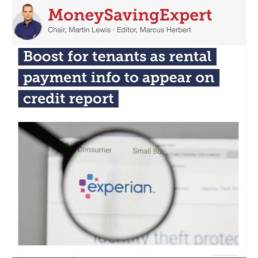Boost for tenants as rental payment info to appear on credit report – 24 October 2018
Sarah Guershon | Money Writer
Millions of tenants could see their credit score boosted as their rental payment information will now be included on their credit report.
Private renters and social housing tenants can opt in to the free Rental Exchange Initiative which records your rental payments on your Experian credit file. The scheme’s actually been running in the background (for those who’ve already signed up) for more than two years with 1.2 million renters’ payments already recorded, but only now are those payments visible in people’s files – and of course, this applies to any new joiners.
As lenders get access to this information too, in theory it could make it easier for those who pay their rent on time to get onto the property ladder or be accepted for other credit products.
Of course, if you miss payments, it’ll have a negative impact on your file (and your score) – more on that below.
Experian estimates 79% of tenants already signed up will see a noticeable improvement in their credit score – but it’s too early to know exactly how lenders will use the extra information.
See our full guide on How to Improve Your Credit Rating and check your score for free with our Credit Club.
What is Rental Exchange?
The Rental Exchange scheme was launched by credit reference agency Experian and The Big Issue Group in March 2016 as a way of allowing tenants to build up a credit history and ultimately improve their credit rating by paying their rent on time each month.
The scheme uses rental payment data in the same way it would mortgage payment data, so if you’re signed up, your payments will be recorded and added to your credit file.
Before Rental Exchange, some renters were unable to show they could meet regular payments, particularly if they didn’t already have a traditional credit product.
More than 150 social housing providers, local authorities and letting agents are reporting data into the Rental Exchange scheme with more expected to come on board – though you can opt to do it yourself now if yours hasn’t signed up yet. If you rent from a private landlord, you’ll most likely need to ask to join the scheme.
It’s worth noting you can’t add your monthly payment data retrospectively as it’s only collected from the point you sign up and it starts to be shared – so the sooner you join the scheme, the better. However, the account will show the start date of your tenancy, which, if you’ve been in the property a while, could show longevity and stability – two big positives for lenders.
Is it just Experian?
As this is an Experian scheme, so far, Experian is the only credit agency to record rental payments. The other two, Equifax and Callcredit, don’t currently take them into account, which means that if you’ve joined the Rental Exchange, your score may differ significantly between these agencies’ credit reports. However, lenders won’t see your score, just your credit history.
How can you join the Rental Exchange scheme?
You can easily join the scheme if your social housing provider, letting agent or private landlord is already signed up.
How to join if you’re in social housing:
Ask your social housing provider if they’re one of the 150 already part of the scheme.
If they are, your rental payment information should be automatically recorded – if you don’t want to be part of the scheme, Experian told us you will need to opt out.
If they’re not, you can ask them to join and request your information be added, or see below on how to self-report.
How to join as a private tenant
Ask your landlord or letting agent if they are part of the scheme. Unfortunately, despite asking, Experian won’t tell us which landlords and agents are part of it.
If they are, request for your payment information to be added.
If they’re not, you can self-report as below.
Social housing provider, letting agent or landlord not part of Rental Exchange?
Don’t panic, you can still join the initiative if you want to, but the way your payments are reported is slightly different.
You’ll need to sign up to one of Experian’s partners Credit Ladder or Canopy and connect them to the bank account from which you pay rent (granting read-only access) and it uses Open Banking to verify and monitor rent payments. Of course, you’ll need to be comfortable sharing your details.
The easiest way to check if you’ve already joined (in case you’ve forgotten), is to speak to your landlord or view your Experian credit report. You can do this via our free Credit Club.
What’s the benefit of joining the scheme and why is my credit file important?
Making your payments on time (which 98% of private tenants do, according to Experian) could see your credit history improve, therefore making it easier to prove your identity and apply for credit products.
Think of your credit file as your financial CV. It gives potential lenders an insight into your spending history, allowing them to make an informed decision as to whether they want to take you on as a 24 October 2018 your rental payments will make you more attractive to a lender. Showing you can meet payments on time will improve your credit score, though lenders won’t see this. They’ll have their own scoring system and will take into account your affordability. And as mortgage payments could end up being more affordable than your current rent, you could see yourself on the property ladder far sooner.
See our credit boosting tips for full info on what a credit rating is and how to improve it.
What are the drawbacks?
If you’ve struggled to pay your rent in the past, have been late with payments or missed them completely, Rental Exchange won’t be right for you as it could negatively impact your credit file. If you’re in social housing and don’t want to take part in the scheme, as above, you can opt out.
The score you see reflects your file and generally, the lower your score, the harder it will be for you to get any kind of credit.
What does Experian say?
Clive Lawson, managing director of Experian Consumer Services, said: “We’re proud Experian is the first credit reference agency to add rental payment data to credit reports, leading the way in helping people understand their financial health. Tenants pay a significant amount of money each month for the roofs over their heads, so it’s right to recognise these regular payments in a similar way as mortgages.
“Adding rental payment data to credit reports would help millions of people prove their identity so they can access online services and mainstream finance. We’re already working with a range of lenders who want to use rental data to improve their understanding of a person’s financial situation so they can make higher quality decisions.”
What do the lenders say?
We asked some of the biggest lenders how including rental payment information will impact their lending decisions if at all.
Lloyds Banking Group (which includes Bank of Scotland and Scottish Widows) said: “Rent could prove useful in making lending decisions though we would need to further assess how best to use this.”
HSBC said: “We would always encourage people to try to build up a credit history, as this helps us consider the creditworthiness of those looking to borrow money. As [HSBC is] a responsible lender, applications are assessed on the affordability of any mortgage, taking into account the income and outgoings of the applicant, including their ongoing financial commitments.”
Santander said: “We assess individuals on affordability, lending criteria and their credit score. As [Santander is] a prudent lender, access to information that supports the application is positive and will help provide a more in-depth picture of a potential borrower.”
Also see Credit Ladder a collaboration between Experian and Equifax. https://www.creditladder.co.uk/

